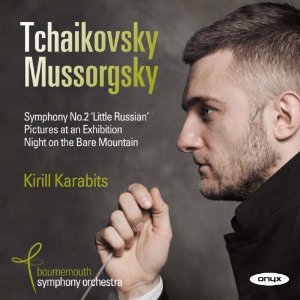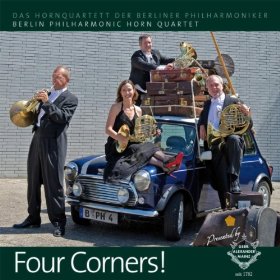Classical CDs Weekly: Mozart, Tchaikovsky, Berlin Philharmonic Horn Quartet | reviews, news & interviews
Classical CDs Weekly: Mozart, Tchaikovsky, Berlin Philharmonic Horn Quartet
Classical CDs Weekly: Mozart, Tchaikovsky, Berlin Philharmonic Horn Quartet
Still stuck for Christmas gift ideas? Look no further...

 Mozart: Piano Concertos no 6, 8 and 9 Angela Hewitt (piano), Orchestra da Camera di Mantova (Hyperion)
Mozart: Piano Concertos no 6, 8 and 9 Angela Hewitt (piano), Orchestra da Camera di Mantova (Hyperion)
This first volume in Angela Hewitt’s projected Mozart concerto series deserves praise for featuring three early pieces, instead of starting with the better-known mature works. Which isn’t a slight on these three concertos, each of which sounds like fully-formed Mozart, particularly the Concerto no 9, written when the composer was 20. Rather than a work made up of solos interspersed with tutti passages, piano and orchestra feel inseparable here, the piano making a cheeky entrance within seconds of the concerto’s opening. And the key of Eb seems to provide the cue for some sublime orchestral wind writing, with some delicious solos for oboes and horn in the first movement. Hewitt really shines in the enigmatic, melancholy slow movement, its brooding aria perfectly cast for a Baroque keyboard specialist to play. So few notes, but the art lies in making such superficially simple music express so much. This work is a masterpiece, and I’m glad that it was Hewitt’s performance which was my introduction to it.
The two earlier concertos are more conventional, but each offers many incidental pleasures – the flamboyant horn writing in the last movement of no 6, or the combination of grandeur and effervescence at the start of no 8. Hewitt’s performances, directing the Orchestra da Camera di Mantova from the keyboard, are brilliant. She’s both witty and profound. And, most importantly, she’s never too sweet or sentimental in her approach; Mozart’s music doesn’t need kid gloves or an excess of sugar to have an impact. You also get Hewitt’s erudite, entertaining sleeve notes in the CD booklet.
 Tchaikovsky: Symphony no 2, Mussorgsky: Night on the Bare Mountain, Pictures at an Exhibition (orch. Ravel) Bournemouth Symphony Orchestra/Kirill Karabits (Onyx)
Tchaikovsky: Symphony no 2, Mussorgsky: Night on the Bare Mountain, Pictures at an Exhibition (orch. Ravel) Bournemouth Symphony Orchestra/Kirill Karabits (Onyx)
Tchaikovsky’s first three symphonies aren’t heard enough, eternally overshadowed by the doomier later ones. I’ve long had a soft spot for the five-movement Third, but here’s a scintillating new account of the revised version of no 2, the Little Russian – so called because of Tchaikovsky’s use of Ukrainian folk tunes. And it’s performed here by a Ukrainian conductor, who manages to make a British orchestra sound remarkably Slavic. Kirill Karabits’ approach is bold, declamatory – the moody horn solo a touch more brazen than usual, and the first movement’s climax is incendiary. But this is also a symphony which oozes charm, and Karabits’ inner movements are played with smiling grace. Tchaikovsky’s brassy finale offers a lesson in how to endlessly develop a simple idea without ever making it sound dull. There’s a terrific moment in this performance a few minutes before the symphony closes, where a huge tam-tam stroke temporarily brings proceedings to a halt before a very Tchaikovskian happy ending.
Karabits’ couplings include the original version of Mussorgsky’s Night on the Bare Mountain, usually heard in Rimsky-Korsakov’s performing edition, a soft-grained recomposition, complete with schmaltzy coda. Mussorgsky’s satanic original is rougher, brassier and infinitely more unsettling, ending with a bang. And it’s this edginess which I’ve always found missing from Ravel’s finicky orchestration of Pictures at an Exhibition. It’s superbly dispatched here, but I’d much rather hear the unadorned piano original. Orchestral playing is predictably excellent, and Onyx’s recording is detailed and immediate.
 Four Corners! Berlin Philharmonic Horn Quartet (Gebr. Alexander)
Four Corners! Berlin Philharmonic Horn Quartet (Gebr. Alexander)
Sarah Willis, fourth horn of the Berlin Philharmonic, recorded an outstanding version of the Brahms Horn Trio which was reviewed last year. This disc, again released by the German horn makers Alexander, is fluffier stuff – a disc of arrangements where, as the Alexander website puts it, “Stefan Dohr, Sarah Willis, Klaus Wallendorf and Fergus McWilliam travel to the four corners of the world and breach the highest and lowest barriers on their 103s from Alexander." Do we need a disc of music arranged for horn quartet? Of course we do. This is an instrumental combination which works, emphatically so: the instument’s enormous range mean that a good arrangement can use the horns like a mini SATB choir. Willis’s bass register is impressive, especially in a swinging take on Waltzing Matilda. And this quartet make a perfect, very European horn sound – fruity but not too dark, with plenty of tonal variety.
They‘re treated to a bunch of consistently clever, witty arrangements, from a variety of sources. There’s a medley of Western film and TV themes, complete with a dash of Morricone and bovine sound effects during "Rawhide". "The Lion Sleeps Tonight" has the quartet sweetly singing in places. We get a snatch of "On Ilkla Moor Baht 'at", snippets of Grieg’s Peer Gynt alongside chunks of Johann Strauss and Brahms, all exploiting these players‘ talents. No one sounds underused – one of the arrangers writes in the sleeve notes about the need to ensure that each player gets a chance to shine, whatever register they’re playing in. Horn buffs won’t need persuading to buy this disc. The rest of you should buy it too.
Watch "The Making of Four Corners!"
The future of Arts Journalism
You can stop theartsdesk.com closing!
We urgently need financing to survive. Our fundraising drive has thus far raised £49,000 but we need to reach £100,000 or we will be forced to close. Please contribute here: https://gofund.me/c3f6033d
And if you can forward this information to anyone who might assist, we’d be grateful.

Subscribe to theartsdesk.com
Thank you for continuing to read our work on theartsdesk.com. For unlimited access to every article in its entirety, including our archive of more than 15,000 pieces, we're asking for £5 per month or £40 per year. We feel it's a very good deal, and hope you do too.
To take a subscription now simply click here.
And if you're looking for that extra gift for a friend or family member, why not treat them to a theartsdesk.com gift subscription?
more Classical music
 Hallé John Adams festival, Bridgewater Hall / RNCM, Manchester review - standing ovations for today's music
From 1980 to 2025 with the West Coast’s pied piper and his eager following
Hallé John Adams festival, Bridgewater Hall / RNCM, Manchester review - standing ovations for today's music
From 1980 to 2025 with the West Coast’s pied piper and his eager following
 Kaploukhii, Greenwich Chamber Orchestra, Cutts, St James's Piccadilly review - promising young pianist
A robust and assertive Beethoven concerto suggests a player to follow
Kaploukhii, Greenwich Chamber Orchestra, Cutts, St James's Piccadilly review - promising young pianist
A robust and assertive Beethoven concerto suggests a player to follow
 Robin Holloway: Music's Odyssey review - lessons in composition
Broad and idiosyncratic survey of classical music is insightful but slightly indigestible
Robin Holloway: Music's Odyssey review - lessons in composition
Broad and idiosyncratic survey of classical music is insightful but slightly indigestible
 Classical CDs: Wolf-pelts, clowns and social realism
British ballet scores, 19th century cello works and contemporary piano etudes
Classical CDs: Wolf-pelts, clowns and social realism
British ballet scores, 19th century cello works and contemporary piano etudes
 Bizet in 150th anniversary year: rich and rare French offerings from Palazzetto Bru Zane
Specialists in French romantic music unveil a treasure trove both live and on disc
Bizet in 150th anniversary year: rich and rare French offerings from Palazzetto Bru Zane
Specialists in French romantic music unveil a treasure trove both live and on disc
 Scottish Chamber Orchestra, Ibragimova, Queen’s Hall, Edinburgh review - rarities, novelties and drumrolls
A pity the SCO didn't pick a better showcase for a shining guest artist
Scottish Chamber Orchestra, Ibragimova, Queen’s Hall, Edinburgh review - rarities, novelties and drumrolls
A pity the SCO didn't pick a better showcase for a shining guest artist
 Kilsby, Parkes, Sinfonia of London, Wilson, Barbican review - string things zing and sing in expert hands
British masterpieces for strings plus other-worldly tenor and horn - and a muscular rarity
Kilsby, Parkes, Sinfonia of London, Wilson, Barbican review - string things zing and sing in expert hands
British masterpieces for strings plus other-worldly tenor and horn - and a muscular rarity
 From Historical to Hip-Hop, Classically Black Music Festival, Kings Place review - a cluster of impressive stars for the future
From quasi-Mozartian elegance to the gritty humour of a kitchen inspection
From Historical to Hip-Hop, Classically Black Music Festival, Kings Place review - a cluster of impressive stars for the future
From quasi-Mozartian elegance to the gritty humour of a kitchen inspection
 Shibe, LSO, Adès, Barbican review - gaudy and glorious new music alongside serene Sibelius
Adès’s passion makes persuasive case for the music he loves, both new and old
Shibe, LSO, Adès, Barbican review - gaudy and glorious new music alongside serene Sibelius
Adès’s passion makes persuasive case for the music he loves, both new and old
 Anja Mittermüller, Richard Fu, Wigmore Hall review - a glorious hall debut
The Austrian mezzo shines - at the age of 22
Anja Mittermüller, Richard Fu, Wigmore Hall review - a glorious hall debut
The Austrian mezzo shines - at the age of 22
 First Person: clarinettist Oliver Pashley on the new horizons of The Hermes Experiment's latest album
Compositions by members of this unusual quartet feature for the first time
First Person: clarinettist Oliver Pashley on the new horizons of The Hermes Experiment's latest album
Compositions by members of this unusual quartet feature for the first time

Add comment